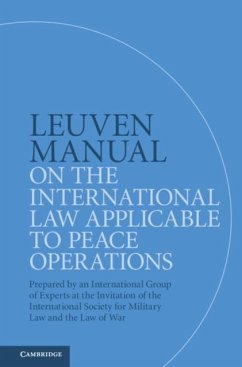
Privatizing War (eBook, PDF)
Private Military and Security Companies under Public International Law
Versandkostenfrei!
Sofort per Download lieferbar
114,95 €
inkl. MwSt.
Weitere Ausgaben:

PAYBACK Punkte
57 °P sammeln!
A growing number of states use private military and security companies (PMSCs) for a variety of tasks, which were traditionally fulfilled by soldiers. This book provides a comprehensive analysis of the law that applies to PMSCs active in situations of armed conflict, focusing on international humanitarian law. It examines the limits in international law on how states may use private actors, taking the debate beyond the question of whether PMSCs are mercenaries. The authors delve into issues such as how PMSCs are bound by humanitarian law, whether their staff are civilians or combatants, and ho...
A growing number of states use private military and security companies (PMSCs) for a variety of tasks, which were traditionally fulfilled by soldiers. This book provides a comprehensive analysis of the law that applies to PMSCs active in situations of armed conflict, focusing on international humanitarian law. It examines the limits in international law on how states may use private actors, taking the debate beyond the question of whether PMSCs are mercenaries. The authors delve into issues such as how PMSCs are bound by humanitarian law, whether their staff are civilians or combatants, and how the use of force in self-defence relates to direct participation in hostilities, a key issue for an industry that operates by exploiting the right to use force in self-defence. Throughout, the authors identify how existing legal obligations, including under state and individual criminal responsibility should play a role in the regulation of the industry.
Dieser Download kann aus rechtlichen Gründen nur mit Rechnungsadresse in A, B, BG, CY, CZ, D, DK, EW, E, FIN, F, GR, HR, H, IRL, I, LT, L, LR, M, NL, PL, P, R, S, SLO, SK ausgeliefert werden.













